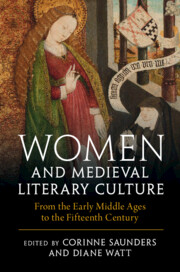Book contents
- Women and Medieval Literary Culture
- Women and Medieval Literary Culture
- Copyright page
- Contents
- Illustrations
- Contributors
- Acknowledgements
- Introduction
- I Patrons, Owners, Writers, and Readers in England and Europe
- II Circles and Communities in England
- III Health, Conduct, and Knowledge
- IV Genre and Gender
- V Women as Authors
- Chapter 18 Marie de France
- Chapter 19 Julian of Norwich
- Chapter 20 The Communities of The Book of Margery Kempe
- Chapter 21 Christine de Pizan
- Chapter 22 Beyond Borders
- General Index
- Index of Manuscripts
- References
Chapter 22 - Beyond Borders
Women Poets in Ireland, Scotland, and Wales up to c. 1500
from V - Women as Authors
Published online by Cambridge University Press: 28 July 2023
- Women and Medieval Literary Culture
- Women and Medieval Literary Culture
- Copyright page
- Contents
- Illustrations
- Contributors
- Acknowledgements
- Introduction
- I Patrons, Owners, Writers, and Readers in England and Europe
- II Circles and Communities in England
- III Health, Conduct, and Knowledge
- IV Genre and Gender
- V Women as Authors
- Chapter 18 Marie de France
- Chapter 19 Julian of Norwich
- Chapter 20 The Communities of The Book of Margery Kempe
- Chapter 21 Christine de Pizan
- Chapter 22 Beyond Borders
- General Index
- Index of Manuscripts
- References
Summary
This essay addresses three fifteenth- and early sixteenth-century women writers who composed erotic and satiric verse: the Welsh poet Gwerful Mechain, and the Scottish Gaelic poets, Iseabal Campbell, Countess of Argyll, and her daughter, Iseabal Ní Mheic Cailéan. Adopting an archipelagic feminist approach, Charnell-White locates these figures within the broader context of late medieval bardic culture in Ireland, Scotland, and Wales, emphasising their high social status and family connections. While the poetry of Gwerful Mechain was highly regarded in her own time and a significant body of her work remains, far fewer poems by Iseabal Campbell and Iseabal Ni Mheic Cailéan survive; like Mechainߣs, however, they were written to be performed before specific audiences. The essay reads the poetry of all three as playfully reappropriating and subverting the formulaic misogynism typical of the male-authored verse in their bardic or coterie groups. In responding to the kind of anti-feminist motifs characteristic of the European tradition of the querelle des femmes, these poets challenge courtly ideals of women as chaste, silent, and obedient and present female sexuality in empowering terms.
Keywords
- Type
- Chapter
- Information
- Women and Medieval Literary CultureFrom the Early Middle Ages to the Fifteenth Century, pp. 457 - 477Publisher: Cambridge University PressPrint publication year: 2023



